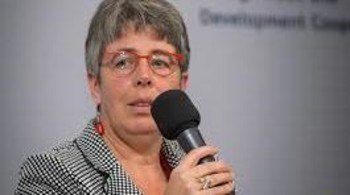Dutch Vice-Minister: South Sudan must have clear peace plan

It is vital that South Sudan’s government has a clear plan in place for how it plans to implement the revitalised peace deal, a top Dutch diplomat said.
South Sudan government has come under mounting international pressure as the 2018 peace accord faces challenges, largely because of lack of funds.
In an exclusive interview with Radio Tamazuj on Wednesday, the Vice-Minister for International Cooperation of the Netherlands, Ms. Reina Buijs who is visiting Africa’s youngest nation for the first time said the Kiir administration has to show ownership of the peace process before inviting potential donors.
“First of all is having a plan of the implementation, having a clear budget dedicated to the implementation of the entire agreement and making clear what the priorities are. The commitment and accountability are not to us only as friends and potential donors but particularly to the people of South Sudan,” she said.
Buijs who acknowledged that there is already some form of commitments by the government of South Sudan to fund the peace agreement, said the international community needs to see that public funds are managed in a transparent manner.
“There is need for transparency in budget and accountability,” she stressed.
The top official further said as part of a commitment to the revitalised peace deal, the government of South Sudan must ensure that violence reduces across the country.
She pointed out that inclusiveness in implementation of the agreement, specifically participation of youth and local authorities, will consolidate the peace process.
Resilience building
Buijs said apart from supporting the peace process in South Sudan they will continue to offer humanitarian support but with an emphasis on resilience building in many areas.
“We will continue to support the people most in need of humanitarian aid but perhaps most importantly we try to build the resilience of people through active engagement and also to stimulate private sector because the humanitarian aid is not sustainable in the future and private sector investments are sustainable,” she noted.
During her visit to South Sudan, Buijs said she met “a people living with hope and desperate for peace”. “I also feel that if this peace agreement exists on paper then hope will be lost. I do see a willing population, a population tired of war,” she said.
Access to justice
The Dutch government is currently supporting the justice sector in South Sudan, Buijs said.
“We are working together with the government of South Sudan and the UNDP to have a court for protection of Gender-Based Violence,” she explained.
The Vice-Minister for International Cooperation has expressed concerns over reports of rape and sexual assault on women and girls in the town of Bentiu in November last year.
Buijs called on South Sudan authorities to ensure justice and accountability for the victims of the many crimes committed against civilians.
People in South Sudan are desperate for the conflict to end, according to Buijs.
In September 2018, a revitalised peace accord was signed by South Sudan's President Salva Kiir, main opposition leader Riek Machar and several armed groups in the Ethiopian capital Addis Ababa.
However, much remains to be accomplished before a transitional government is formed in May.